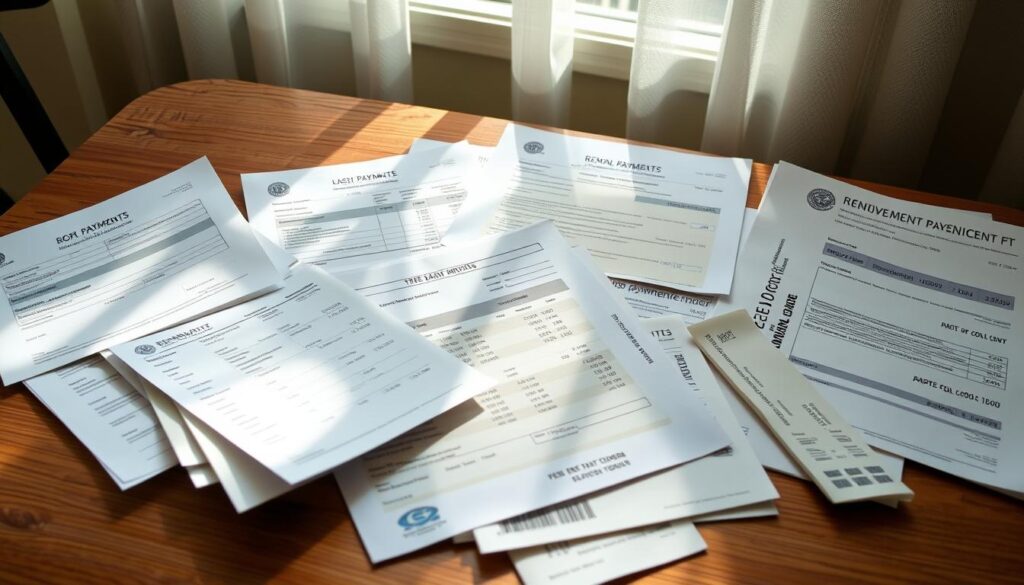Renting a property is a big step. Landlords need to check potential tenants carefully. Looking at rental history is a great way to do this.
There are free and easy ways to get this info. These methods help landlords make smart choices about new tenants.
We’ll look at why rental history matters. We’ll also explore tools for landlords and property managers. These include tenant reports, eviction records, and payment histories.
Key Takeaways
- Checking rental history is crucial for landlords to make informed decisions about prospective tenants.
- There are several free and easy methods to access a tenant’s rental history, including online databases, credit reports, and landlord references.
- Conducting a thorough rental history check can help landlords identify potential red flags, such as evictions, late payments, or problematic behavior.
- Understanding tenant rights and fair housing laws is essential when screening rental applicants.
- Alternatives to traditional rental history checks, such as security deposits and guarantors, can also be considered.
Introduction to Rental History Check
A rental history check is vital for tenant screening. It helps landlords evaluate a tenant’s reliability and payment habits. This check offers key insights, enabling informed decisions and reducing potential issues.
Why Is Checking Rental History Important?
A tenant’s past often predicts their future behavior. Reviewing payment records and eviction history reveals an applicant’s suitability. This information helps landlords spot risks and make better leasing choices.
Benefits of a Thorough Rental History Check
A comprehensive rental history check offers numerous advantages for landlords. It helps identify red flags like late payments or evictions. It also verifies an applicant’s reliability and lease agreement compliance.
This check assesses the risk of future payment issues or property damage. It can reduce costly tenant turnover and legal disputes. Additionally, it promotes a safer living environment for all tenants.
Thorough checking rental history leads to better-informed decisions. It safeguards landlords’ investments and ensures positive renting experiences. This practice benefits both landlords and responsible tenants.
Tenant Screening Report
Landlords must carefully check potential tenants before renting out their property. A tenant screening report offers key details about an applicant’s background and financial history. This tool helps landlords understand a renter’s profile and decide wisely.
The report includes the applicant’s credit score, rental history, and any past evictions. It also shows legal issues, helping landlords assess a tenant’s reliability. This data is crucial for choosing responsible renters and protecting the property.
By using this report, landlords can ensure a positive rental experience for everyone involved. It helps them select tenants who are likely to pay on time and respect the property.
| Key Components of a Tenant Screening Report |
|---|
|
A thorough review of the tenant screening report benefits both landlords and prospective tenants. It helps create a smooth rental experience and builds trust. This tool sets the stage for a positive landlord-tenant relationship.
“A comprehensive tenant screening report is the foundation of a successful rental business. It allows landlords to make informed decisions and minimize potential risks.”
How to Check Rental History Free
Screening potential tenants requires insight into their rental history. Free methods exist for landlords to access this valuable information. These resources offer data to help make informed leasing decisions.
Online Rental History Database
Online databases are a convenient way to check a tenant’s rental history. These platforms gather information from previous landlords and property management companies. They provide a comprehensive overview of an applicant’s rental experiences.
Landlords can uncover details about payment patterns and lease violations. They can also find any eviction records. All these factors are essential in determining a suitable tenant.
Renter Credit Report
Landlords can obtain a renter’s credit report for more insights. It reveals an individual’s financial stability and payment history. This information helps assess if a tenant will fulfill their rental obligations on time.
Using these free resources to check rental history helps landlords make better decisions. It can reduce risks and find tenants who fit their properties well. Thorough rental history checks can lead to successful landlord-tenant relationships.

Background Check for Renters
Landlords need to conduct thorough background checks for renters. These checks help find responsible and trustworthy tenants. They reveal important information about a prospective renter’s history.
What a Background Check Reveals
A background check for renters uncovers key details about potential tenants. These include criminal records, eviction history, and credit information.
The check also verifies employment and income. It provides insights from previous landlords about the renter’s behavior and reliability.
- Criminal records: This can identify any past convictions or legal issues that may impact their ability to be a reliable tenant.
- Eviction history: Learning about any previous evictions can help you assess the renter’s track record and potential risk.
- Credit history: Reviewing the renter’s credit report can provide insights into their financial responsibility and payment habits.
- Employment and income verification: Confirming the renter’s income and employment status can ensure they have the means to consistently pay rent.
- References from previous landlords: Reaching out to a renter’s past landlords can offer valuable insights into their behavior and reliability as a tenant.
Understanding what a background check reveals helps you make an informed decision. You can better assess if a prospective renter fits your property.
“Conducting a thorough background check on potential tenants is an essential step in the rental process. It helps protect your property and ensure you find responsible, reliable renters.”
Eviction Records Search
An eviction records search is vital when screening potential tenants. It reveals a renter’s past issues with landlords and payment problems. This information helps landlords make smarter decisions and avoid future conflicts.
This search involves checking public court records and databases for previous evictions. It also uncovers legal disputes a tenant may have faced. Landlords can spot red flags and protect their investments with this data.
Key Benefits of Checking Eviction Records
- Identify potential payment issues or conflicts with previous landlords
- Assess the likelihood of a tenant complying with rental agreements and property policies
- Mitigate the risk of costly legal proceedings and property damage
- Ensure a safe and positive rental experience for both the landlord and the tenant
| Eviction Records Search | Explanation |
|---|---|
| Public Court Records | Searching court databases for any previous eviction filings or court rulings related to the tenant |
| Tenant Screening Services | Utilizing professional tenant screening services that compile and report on a renter’s eviction history |
| Landlord References | Directly contacting previous landlords to inquire about the tenant’s rental history and any eviction-related issues |
Investigating a tenant’s eviction records helps landlords reduce future problems. It leads to better decisions and a positive rental experience. This process benefits both landlords and tenants in the long run.
Rental Payment History
Landlords need to check a potential tenant’s rental payment history. It shows how reliable they are with rent payments. This helps landlords decide if someone is a good fit as a tenant.
Importance of Payment History
A tenant’s rental payment history reveals their financial habits. It shows how well they manage money and honor rental agreements. Landlords use this info to predict future payment behavior.
Looking at payment history helps landlords gauge financial stability. It shows if an applicant can meet rental commitments. This knowledge is key for a smooth landlord-tenant relationship.
| Importance of Rental Payment History | Benefits for Landlords |
|---|---|
| Assesses financial responsibility | Minimizes risk of late or missed payments |
| Predicts reliability of on-time rent payments | Ensures stable rental income and positive cash flow |
| Identifies potential issues with past tenancies | Helps select responsible and trustworthy tenants |

Reviewing rental payment history helps landlords make smart choices. It protects their investment and creates better landlord-tenant relationships. This process benefits both parties in the long run.
Landlord Reference Check
A thorough landlord reference check reveals crucial information about potential tenants. It helps landlords assess an applicant’s past behavior and trustworthiness. This process aids in making informed decisions about prospective renters.
Questions to Ask Previous Landlords
Asking the right questions during a reference check uncovers key details about a tenant’s history. These inquiries provide a comprehensive understanding of the applicant’s rental background.
- How long did the tenant reside at the property?
- Was the tenant consistently on-time with rent payments?
- Did the tenant maintain the property in good condition?
- Were there any issues with noise, disturbances, or damages?
- Would you rent to this tenant again?
- Is there anything else I should know about this applicant’s rental history?
These landlord reference check questions offer valuable insights into the applicant’s past behavior. You’ll learn about their payment history and overall reliability as a tenant. This information helps determine if the prospective renter suits your property.
A comprehensive landlord reference check helps you avoid potential issues in the future. By contacting previous landlords, you increase your chances of selecting responsible tenants. This extra step ensures a smoother rental experience for everyone involved.
Previous Landlord Verification
Checking a potential tenant’s previous landlords is crucial in the screening process. It confirms the accuracy of their rental history and addresses any concerns. This step helps landlords make informed decisions about applicants.
Contacting previous landlords offers insights into the tenant’s payment history and behavior. It reveals how well they maintained the property. This information helps determine if the applicant is reliable and responsible.
Key Benefits of Previous Landlord Verification
- Verify the accuracy of the applicant’s rental history and address any inconsistencies
- Assess the applicant’s payment history and responsible tenancy
- Identify potential red flags, such as property damage or disputes with previous landlords
- Gain a better understanding of the applicant’s overall behavior and trustworthiness
Effective Strategies for Previous Landlord Verification
- Obtain the applicant’s consent to contact their previous landlords
- Prepare a list of relevant questions to ask, such as payment history, property condition, and overall tenant behavior
- Carefully document the responses from the previous landlords and compare them to the information provided by the applicant
- Follow up on any discrepancies or concerns to gain a comprehensive understanding of the applicant’s rental history
| Key Questions to Ask Previous Landlords | Importance |
|---|---|
| 1. Was the tenant’s rent paid on time each month? | Assesses the applicant’s payment history and financial responsibility |
| 2. Did the tenant maintain the property in good condition? | Indicates the applicant’s level of care and respect for the rental property |
| 3. Were there any issues or disputes with the tenant? | Reveals potential red flags in the applicant’s behavior and tenant-landlord relations |
| 4. Would you rent to this tenant again? | Provides an overall assessment of the applicant’s suitability as a tenant |
Thorough previous landlord verification helps landlords avoid renting to problematic tenants. It’s key to maintaining a well-managed property. This process ensures a positive experience for both landlords and tenants.
Online Resources for Rental History Checks
Landlords can access various online resources for rental history checks. These include paid and free options. Each service offers different benefits to help landlords choose wisely.
Paid vs. Free Online Services
Paid online resources often provide more detailed information for rental history checks. They may include national tenant databases, eviction records, and credit reports. These services usually require a subscription or per-check fee.
Free online resources can also offer valuable information to landlords. Many government websites provide public records, including eviction filings and court records. Some rental history check websites offer limited free trials or basic features.
| Paid Services | Free Services |
|---|---|
|
|
The choice between paid and free online resources depends on several factors. Landlords should consider their specific needs, budget, and required level of detail. Comparing options helps landlords make informed decisions that benefit their property management goals.

Understanding Tenant Rights
Landlords must know tenant rights when doing rental history checks. This ensures fair screening and follows local rules. It protects both landlords and potential tenants.
Tenants have legal rights during rental applications and occupancy. Knowing these rights helps landlords screen tenants well and avoid legal troubles.
Key Tenant Rights to Consider
- Right to Privacy: Tenants have the right to privacy, which means landlords must obtain permission before entering the rental property or accessing personal information.
- Non-Discrimination: Landlords cannot discriminate against tenants based on factors such as race, color, religion, national origin, disability, or family status.
- Fair Housing Laws: Landlords must comply with fair housing laws, which prohibit discrimination and ensure equal access to housing opportunities.
- Accurate Rental History: Tenants have the right to access and correct any inaccuracies in their rental history records.
- Timely Notification: Landlords must provide tenants with adequate notice before making changes to the rental agreement or terminating the lease.
Respecting tenant rights helps landlords build good tenant relationships. It keeps them following local laws. This creates a fair rental environment for all.
“Protecting tenant rights is not only a legal obligation, but it also fosters a positive and collaborative landlord-tenant relationship.”
Red Flags to Look For
Landlords should watch for red flags when checking a tenant’s rental history. These signs can reveal past behavior and help make smart decisions about potential renters.
Common Red Flags in Rental History
Here are some common red flags to spot in a rental history:
- Frequent moves or short tenancy periods: Tenants who have a history of moving frequently or staying in a rental for a short time may be a cause for concern.
- Late or missed rent payments: A pattern of late or missed rent payments can signal financial instability or irresponsibility.
- Eviction records: Tenants with a history of evictions may be more likely to cause problems or default on rent.
- Negative feedback from previous landlords: Unfavorable reviews or comments from past landlords can indicate potential issues with the tenant’s behavior or property care.
- Property damage or lease violations: If a tenant has a history of causing property damage or violating lease agreements, it may be a red flag.
Spotting these red flags helps landlords judge the risk of renting to a specific tenant. This information aids in making better choices to protect their property.
Careful screening can lead to a positive rental experience for everyone involved. It’s a crucial step in finding reliable tenants.
“Screening tenants thoroughly by checking their rental history can save landlords from potential headaches down the road.”
Tips for Effective Rental History Screening
Landlords need to conduct thorough rental history screenings to find reliable tenants. This involves checking online databases, reviewing credit reports, and performing background checks. These methods provide valuable insights into a prospective tenant’s rental history.
Landlords should stay current on best practices and industry trends. This includes reviewing screening reports, verifying references, and monitoring eviction records. Staying vigilant ensures a comprehensive and fair evaluation of each applicant.
- Utilize online rental history databases to access detailed records of a tenant’s previous rental experiences.
- Obtain a renter’s credit report to assess their financial responsibility and payment history.
- Conduct a thorough background check to uncover any potential red flags, such as criminal history or eviction records.
- Reach out to previous landlords to verify the accuracy of the information provided by the applicant and gain additional insights into their rental history.
- Stay informed about the latest trends and best practices in the rental industry to ensure that your screening process remains effective and up-to-date.
Using these tips for effective rental history screening can help landlords find responsible tenants. This leads to more successful and profitable rental property management.

“Thorough rental history screening is the key to identifying the right tenants and avoiding potential problems down the line.”
Alternatives to Rental History Checks
Checking a tenant’s rental history is vital for screening. However, sometimes this info is limited or unavailable. Landlords can use other methods to gather necessary information about prospective tenants.
Other Screening Methods
Landlords can consider alternative screening methods when rental history isn’t accessible. These methods help make informed decisions about potential tenants.
- Credit Checks: Reviewing a tenant’s credit report can provide insights into their financial stability and creditworthiness, which can be indicative of their ability to make timely rent payments.
- Income Verification: Requesting documentation, such as pay stubs or tax returns, to confirm a tenant’s income can help assess their capacity to afford the rent.
- Personal References: Contacting personal references, such as employers or friends, can provide valuable insights into a tenant’s character and reliability.
These methods are useful when rental history is limited. They help landlords assess a tenant’s suitability more accurately.
“Effective tenant screening is crucial for landlords to mitigate risks and ensure a positive rental experience for both parties.”
Using a mix of these screening methods can provide valuable information. This approach helps landlords make better decisions about potential tenants.
Fair Housing Laws and Rental History
Landlords must follow fair housing laws when checking rental history. These laws protect tenants from discrimination based on race, gender, or family status. They ensure a fair screening process for all applicants.
The Fair Housing Act of 1968 prohibits housing discrimination. It covers race, color, religion, national origin, sex, disability, and family status. Landlords must be careful when using rental history for tenant selection.
To comply with fair housing laws, landlords should use clear screening criteria. They should apply these criteria equally to all applicants. It’s important to avoid assumptions based on rental history.
Landlords should focus on objective factors like payment history and lease compliance. They should explain any adverse decisions to applicants. Offering applicants a chance to explain their rental history is also important.
By following these guidelines, landlords can avoid legal issues. They also ensure a fair tenant selection process.
- Establish clear and consistent screening criteria that are applied equally to all applicants.
- Avoid making assumptions or generalizations based on an applicant’s rental history.
- Focus on objective factors such as payment history, property damage, and compliance with lease terms.
- Provide applicants with a clear explanation of the reasons for any adverse decisions based on rental history.
- Offer applicants the opportunity to explain or provide additional context for their rental history.
| Fair Housing Act Protections | Prohibited Discrimination Factors |
|---|---|
| Federal Fair Housing Act | Race, Color, Religion, National Origin, Sex, Disability, Familial Status |
| State and Local Fair Housing Laws | May include additional protected characteristics such as source of income, sexual orientation, or gender identity |
“Landlords must be vigilant in ensuring that their rental history screening process is fair and complies with all applicable fair housing laws.”
Conclusion
Checking a potential tenant’s rental history is crucial for landlords. It helps make informed decisions and reduces future risks. A thorough rental history check can lead to successful landlord-tenant relationships.
Landlords have many free tools to vet prospective tenants. These include online databases and renter credit reports. By exploring how to check rental history free, landlords can uncover valuable insights about renters.
Reviewing rental history helps landlords make smart choices for their properties. It allows them to maintain reliable tenants. This proactive approach fosters positive relationships and ensures long-term success in rental businesses.

